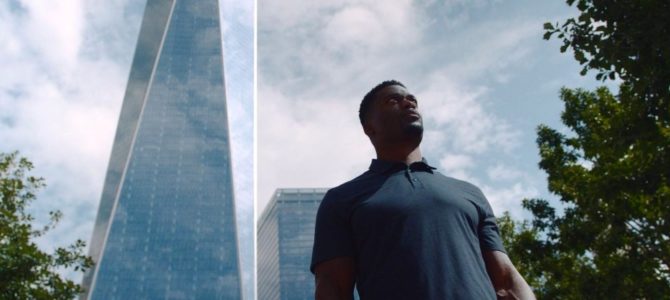
For decades, star athlete Benjamin Watson has earned accolades and been in the media limelight. But it’s not what drives him.
During the 2002 Southeastern Conference Championship Game, Watson scored the winning touchdown for the Georgia Bulldogs. Three years later, in his rookie NFL season with the New England Patriots, they reached the Super Bowl and defeated the Eagles 24-21. In 2016, he was named a Pro Bowl alternate. This spring, Watson announced his retirement.
His first significant post-NFL project is not one most athletes would tackle. In the documentary film “Divided Hearts of America,” which premieres Sept. 17, Watson and his wife, Kirsten, interview diverse voices on controversial topics of life and abortion.
“We don’t see this as a film that is for one tribe,” said Watson in a phone interview. “Abortion has affected people in different ways, and we need to see the humanity of all sides involved.”
Their work in humanitarian and justice causes reaches beyond pro-life advocacy. He has led trips overseas to raise support for anti-trafficking nonprofit International Justice Mission. For years, his articles at All Pro Dad have advised fathers. And a new criminal justice reform initiative features Watson as a spokesman.
While on the road with his family in the mountains of Colorado, Watson spoke in an interview about his NFL career, the new film, and how his faith fuels a stand for the value of every life. It has been lightly edited for length.
Football and Family
Josh M. Shepherd: When you retired from the NFL in March, do you feel you finished strong in terms of career goals?
Benjamin Watson: When I set out to play, I didn’t know how long it was going to be. My first several years were difficult on a lot of fronts — injuries that come with football, some ups, and downs. But my goals were always to win the Super Bowl and to go to the Pro Bowl, which I did accomplish.
Colossians chapter 3 talks about the call to “work heartily,” which is what I set out to do on the football field. Most importantly, I tried to give of myself, care for my teammates, and be a good example.
JS: You are known as quite the family man, with seven kids. How do you manage it?
BW: Our seven kids range from age 11 down to one, and the last two are identical twin boys. We believe parenting has to be intentional. My wife, Kirsten, who is very organized and energetic, runs the house like a tight ship. It’s amazing to see how the kids fall in line. The oldest two are girls, which benefits us because they’re more helpful than the boys would be.
Kids are malleable and able to be guided if parents really put in the work. It’s not that we are perfect parents at all, but we do try to teach them and raise them to know the Lord and read the scriptures. There are also practical things like cleaning up and taking care of your stuff. Our house is definitely not quiet and sometimes rambunctious, but we have a schedule and our kids respect it.
Offering Help to Save Lives
JS: Through One More Foundation, you and your wife have long been involved in community outreach. What has been the focus of your nonprofit group?
BW: In 2008, we created a nonprofit that takes inspiration from Micah 6:8, which says our mission in life is to do justice, to love mercy, and to walk humbly. We’ve moved around a lot in my career. But our goal was to leave an imprint on the community where we lived including providing opportunities, education, and help with basic needs.
Recently, much of our work has been centered on justice. We’ve been involved with purchasing ultrasound equipment for pregnancy centers in a few of the cities where I’ve played. In supporting International Justice Mission, we’ve had hands-on involvement — even leading other players on a trip to the Dominican Republic.
Many people want to do things in their communities, they just don’t know where to start. We want our 501(c)3 group to be a connecting point for people to do things that God has prompted them to do.
JS: Turning to the new film, what sparked you both wanting to do a documentary?
BW: We’ve been working on it for about a year and a half now. The whole reason was to get a gauge on the vibe of America because we’re very divided on this topic of abortion. We interviewed about 30 people with different points of view in academia, medicine, culture, ethics — people who are in the pro-life community and outside of it.
People’s views on abortion are complex, and we need to honor that while still having our own convictions. For me and my wife, also an executive producer of the film, this is a justice issue. The same way we approach racial justice, or the trafficking of minors and adults, or helping those who are in need, it’s the same way that we seek to protect pre-born lives.
Breaking the Silence
JS: As you’ve taken this public stand for life, what has been the response from sports media, teammates, and others in the NFL?
BW: Inside the locker room, there are men who consider themselves pro-choice or pro-life and some guys who don’t think about it at all. Honestly, I know many people — in the NFL, in journalism, and businesses across America — with strong views about protecting pre-born lives and supporting women who are pregnant. Many of them feel silenced.
What I have noticed is, when you lend your voice to certain causes, people who may feel silenced come out in support. It’s tremendous to see that, but it’s also sad to me. Because right now we’re living in a culture where only certain viewpoints are considered to be acceptable. No matter if we agree or not, everybody’s viewpoint should be respected, because that’s what America is all about.
In 2017, when I was playing for the Baltimore Ravens, I spoke at the March for Life. A couple of reporters came up to me later and said they appreciated what I said. As people who have viewpoints considered outside the mainstream, sometimes we feel like we can’t use our voices. My encouragement is: you have a right to speak and should use it.
JS: How does your film address the prevalence of abortion in communities of color?
BW: With any statistic, there needs to be an unpacking. Black women, as opposed to whites and other minorities, make up a shockingly disproportionate amount of abortions. Clearly, I could not go on a journey encompassing these issues without discussing the impact on the black community and specifically black families.
Part of the film is me simply asking experts: Why is this the way it is? How did it get to be this way? What are the contributing factors? We found specific reasons related to economics, health disparities, and other issues that contribute to the outcomes we see.
Tackling Controversy Head-On
JS: You’ve mentioned racial justice, as you often do online, and have even written a book “Under Our Skin” on racial equality. Why are these issues a priority for you?
BW: As one who loves America, I also recognize we are flawed human beings who haven’t fully lived up to our stated principles of liberty and justice for all.
Our nation has declared that it respects all people and believes that every man is on equal footing. Yet there are several disparities in our nation when it comes to black and white that have yet to be addressed. It’s important that we fight to live up to our principles or else the status quo will remain.
When we talk to Christians about this, the biggest need we see is empathy. It’s bearing each other’s burdens and caring about your neighbor because you love the Lord your God with all your heart, mind, and soul. Talk to people who look different than you, listen well, and don’t be distracted by the “whataboutism” that we see on cable news.
Believers need to pick up this torch just like we pick up other torches. We have a long way to go, but I’m still encouraged because there are people and organizations that are leaning into justice and equality. My focus is on supporting and encouraging them to keep going even as they may get pushback from others.
JS: What compels you to speak out on these controversial matters, even when voices on the left or right disagree?
BW: Love is an action, and we see that in the cross and the gospel. From His word we get a sense that God cares about the mistreated, and He wants people to treat each other equitably. Jeremiah chapter 9 talks about Him being a God of lovingkindness, justice, and righteousness.
That’s why it’s important to me. As people of God, we want to honor what God delights in. One of those things is standing for life in all stages of development however we can. It means being a voice and supporting those who are mistreated or in peril or possibly headed that way. For us, these issues are on the same continuum and arc of justice.
From executive producers Benjamin and Kirsten Watson, the documentary film “Divided Hearts of America” releases via streaming-on-demand on Sept. 17.









